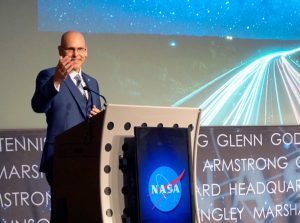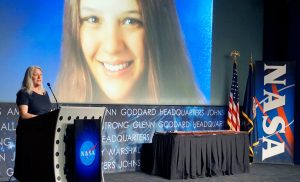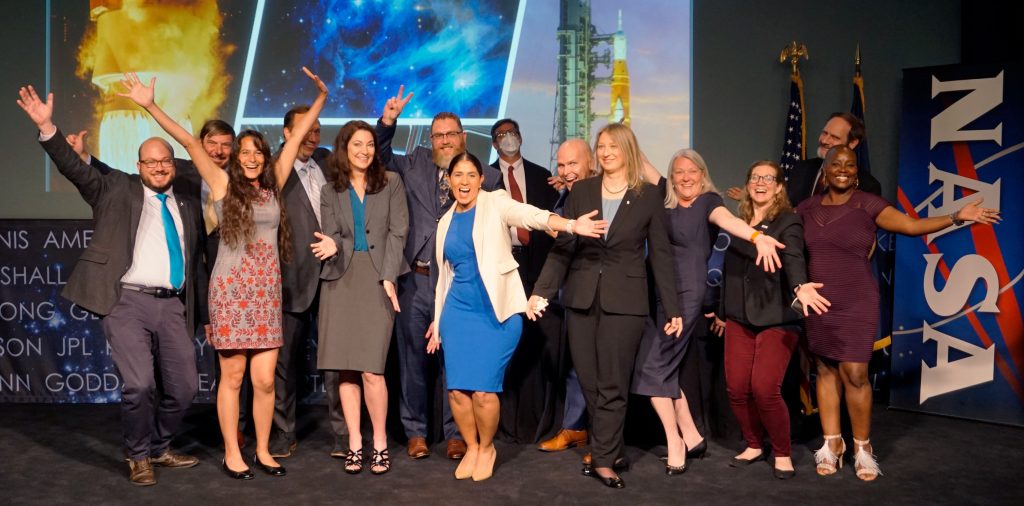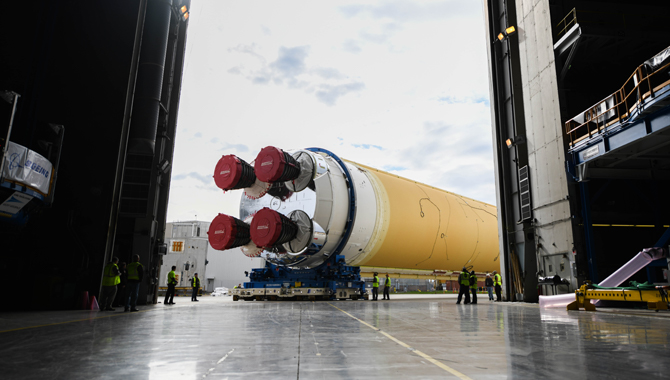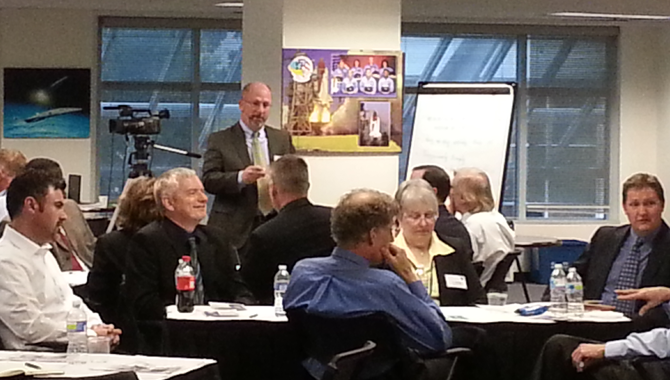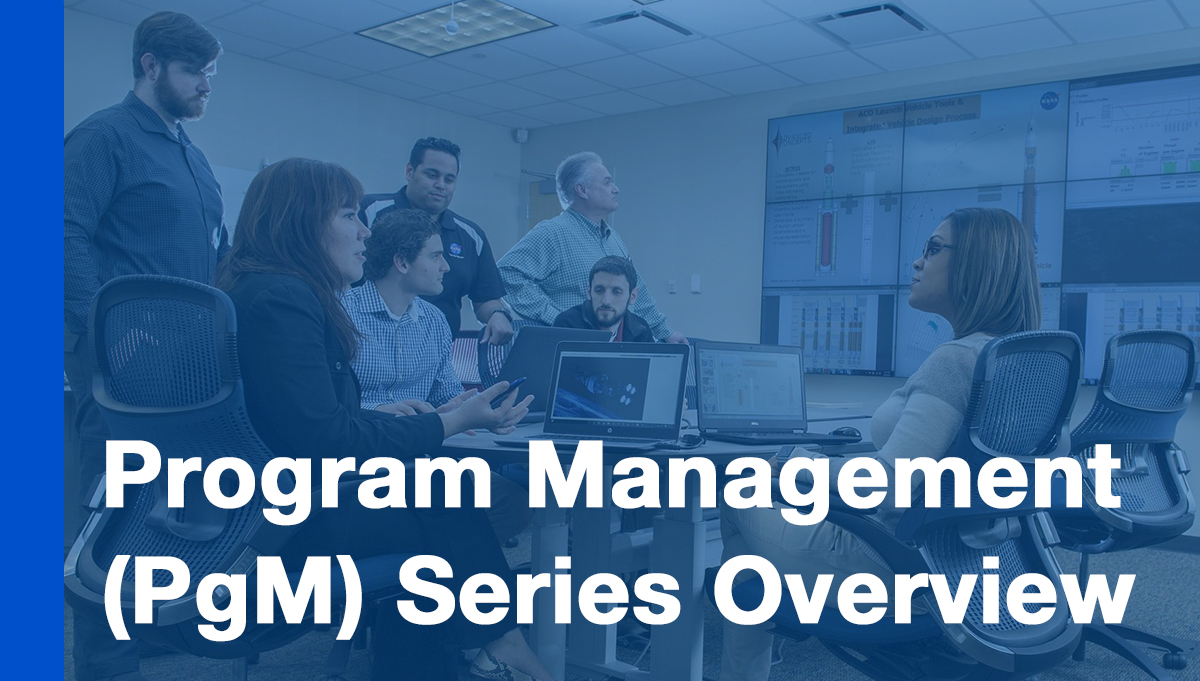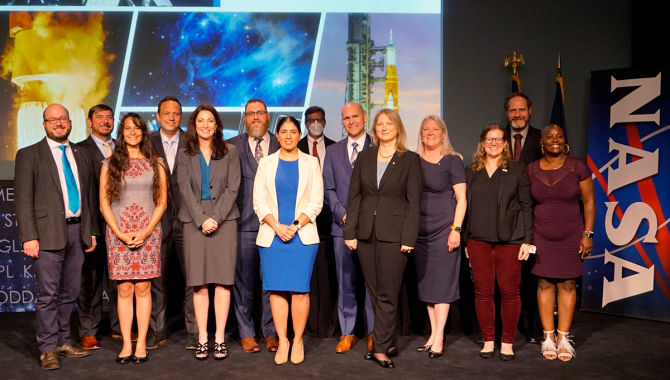
Systems Engineering Leadership Program (SELP) graduates posing for a photo. Left to right front row: Evan Anzalone, Sarah N. D'Souza, Carla Haroz, Claudia Eyzaguirre, Susan Danley, Karma Snyder, Laura Kushner, K. Renee Horton. Back row: Ben Powell, Darren Baird, Miles Skow, Timothy Roberts, Andrew Rechenberg, George J. Williams, Jr.
Credit: NASA/Masha Berger
Cohort completed systems engineering and leadership development program during pandemic.
One of the key attributes of an effective leader is adaptability. Leaders who succeed can efficiently adapt to change and execute a plan to move forward. The 2020-22 cohort of the APPEL Knowledge Services SELP (Systems and Engineering Leadership Program) came to the program to develop their systems engineering and leadership skills and had their adaptability tested as NASA itself adapted to the COVID pandemic sweeping the globe.
The SELP is a comprehensive systems engineering and leadership development program centered on technical hands-on experience, leadership and technical training, benchmarking, mentoring, and coaching. Participants are assigned to work on a project at a different NASA center than where they are based. They also come together for a series of workshops that focus on important aspects of systems engineering, leadership, mentoring, and benchmarking.
The 2020-22 cohort, which graduated on May 18, completed much of the program virtually. Despite the added challenges, the cohort formed the tight personal bonds typical of the program. Many of the participants in the cohort spoke of the support and constructive feedback they received from others in the program at the workshops and during their assignments.
“This is how we feel about each other and about the group: caring, honest, supportive, adaptive, resilient, family, growing together, enlightened …,” said Andy Rechenberg, a 2020-22 SELP participant, speaking at the recent graduation ceremony. “While some of us are meeting for the first time this week, our deep connections will continue long after this graduation ceremony. So that’s us: exhausted, enlightened, and blessed to know each other.”
NASA Deputy Administrator Pam Melroy spoke to the group via recorded message, congratulating the graduates for their efforts to reach this point, and noting that she was pleased they were finally able to meet in person and solidify the team building work of the past two years, and said there is important work ahead.
“We need to be ready to take on the challenges of living and working at the Moon and going on to Mars and other destinations in the solar system,” Melroy said. “We’ll be developing the critical new technologies and systems we need and making sure that they align strategically with the agency’s mission and goals, and we’ll keep creating cutting edge science missions and aeronautics technologies that even now are transforming so many fields.”
“NASA needs systems engineers who are ready to take on those new challenges. This cohort’s education, expertise, and experience along with your participation in SELP have prepared you for these roles. We are entrusting you, the new SELP graduates, to maintain NASA’s technical excellence and find innovative paths forward as we work with new partners, develop new technologies, and explore new opportunities together,” Melroy said.
Members of the diverse SELP cohort spoke at the ceremony, sharing life stories, thoughts on leadership, and formative experiences from their time at NASA. One spoke of core values learned from her father in Venezuela and how that informs her work at NASA. Another told of the dream to become an astronaut, deferred to raise two children, the rewarding NASA career that has followed. Another spoke of an early lesson in the importance of commitment on a team. And another told of the joy of bringing subject matter experts, teammates, and partners together to establish international consensus.
In workshops, the group determined their personality types, core values, and strengths as a leader. They also formulated their ideas about NASA’s future. They benchmarked the Zero Gravity Facility at Glenn Research Center, watched together as the Perseverance Rover landed on, and toured Goddard Space Flight Center as part of graduation. In sharing their experiences at different NASA centers during their SELP assignments, the cohort developed a broader, more comprehensive picture of NASA’s work, how the centers are similar and how they differ.
“…It’s really good to see the diversity within the group here,” said Joseph W. Pellicciotti, NASA Deputy Chief Engineer, speaking at the graduation. “I think diversity of thought and diversity of experiences brings a lot to the forefront of what we want to do within NASA. I don’t think we can achieve our missions without that diversity.”
Pellicciotti noted that the SELP gave the cohort opportunities to learn more about the engineering organizations, processes, and workforce at NASA’s centers. “…Hopefully you realized the skills and the experience that some of your other colleagues at these other facilities have and you’ll be looking forward to … working with them in the future,” he said.
The SELP cohort will now return to assignments at their home NASA centers, but with new systems engineering and leadership skills that can help them advance into roles with greater responsibility. Since the SELP program began, about 90 percent of participants have successfully transitioned into more complex and advanced positions at NASA.






